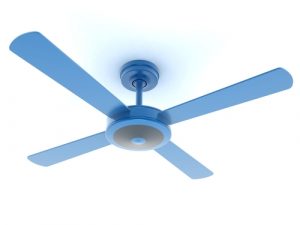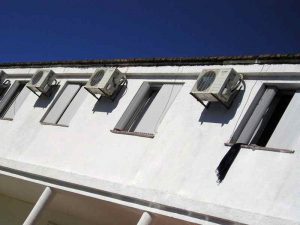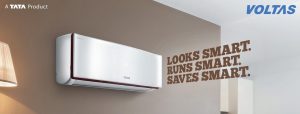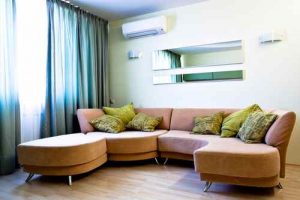Possible reasons for Air Conditioner not cooling properly
We all attach a utility with every object we buy. One of the basic things we expect from an air conditioner is that it should give good cooling. Faster or slower, but it should cool well in order to get the temperatures down to comfortable levels. When it does not do so, we do not derive utility from the product and want to replace it. But these questions arise in several minds: “Why is it that my AC which was cooling well till a few months back is not cooling well now?”, “I bought a new AC but why is it not cooling well?” or “This AC used to work really well a few years back but is ineffective now”. There can be several reasons for the same, some of which can be technical faults as well. But here we would try to explain some of the reasons, which may not be fault in the AC itself.
Direct sunlight on air conditioner outdoor unit
One of the common complaints from people living in northern part of India during peak summers is that the AC is not cooling effectively or the compressor is not working. Unknowingly while installation of the AC, people do not realize that the outdoor unit (in case of split AC) or the outer part of the AC (in case of window AC) is directly facing the sun. All ACs have an optimum operating temperature (ambient or surrounding temperature) at which they can work most effectively. If the temperature increases beyond the optimum temperature, the efficiency of the air conditioner goes down and it can also reach a stage where the compressor stops working completely. At lower efficiency, it can also consume more electricity than that mentioned on the BEE label. Typically numbers on BEE label are in test conditions.
Why this happens? : This happens because the job of AC is to take heat from inside the room and throw it outside. But if the heat outside itself is quite high, then it is not able to do its job properly. Air Conditioners are designed to work at a certain optimum ambient temperature and beyond that they stop working.
How much is optimum temperature? For most ACs it is about 46-48 degrees. Beyond which they can become less effective or may even stop working. These days some brands have models that can handle up to 52 or 54 degrees.
Solution: The best thing that you can do is to avoid installing an AC in such a way that it faces direct sun or is in a place where there is lot of heat. And it is not necessary that heat can happen only in a city where the temperature goes high. It can happen anywhere if the ODU is in closed hot place. Also one can even use an AC with optimum temperature of 46 in a place where the temperature goes high. It would just need a place where the surrounding temperature is low. This can be achieved by placing plants around the AC or by pouring some water on it occasionally (although it can be cumbersome), or by any other creative idea.
Undersized Air Conditioner for the room
One of the common mistakes people make is that they buy AC just based on their budget and not based on the requirement of the room. A small AC in a huge room will always find hard to cool the room in peak summers. Thumb rules for sizing ACs do not work always and one has to look at several parameters while sizing air conditioners. Certain cities are hotter in summers, which mean they require more cooling for the same size room as compared to cities where temperature is less. Some cities are more humid than hot and so the cooling requirement is less, but what is more important is humidity removal. Thumb rule of 1 ton for 100 sq ft (most commonly used thumb rule) does not work always and one should make sure that proper sizing is done before buying AC so that there are no regrets after the purchase.
De-rating of AC with age
Yes aging not only impacts humans, but appliances too. With time efficiencies of most appliances come down. Cooling of an air conditioner reduces with time, or I must say with time it takes more electricity to give the same amount of cooling. As per ASHRAE (American Society of Heating, Refrigerating and Air Conditioning Engineers) an air conditioner reduces its efficiency by 7% in the first year, 5% in the second year, 2% every year in the following years, and this reduction peaks somewhere between 20-30% depending on how well the air conditioner is built. If the AC is 20 yrs or older, it can go down up to 40%. (Source: “A Survey of Refrigerant Heat Transfer and Pressure Drop Emphasizing Oil Effects and In-Tube Augmentation;” ASHRAE Winter Symposium of 1987; Schlager, Pate, and Bergles.).
This means that the older the AC, lesser is the efficiency. So it is not only the improvements in energy ratings by BEE (Bureau of Energy Efficiency) that leads to lowering of star rating for your AC, but also the de-rating factor which can lead to more electricity consumption than mentioned on the BEE label. Some manufacturers have models that have reduced de-rating, but no one has been able to completely eliminate it.
Conclusion
It is not always a technical fault that may lead to less cooling or an ineffective AC. One should make sure that the sizing is done properly and the AC (ODU/external part) is not placed in a very hot environment, as it reduces its efficiency and leads to improper cooling.
Here is a short video for tips to reduce power consumption of air conditioner in India
About the Author:
Abhishek Jain is an Alumnus of IIT Bombay with almost 10 years of experience in corporate before starting Bijli Bachao in 2012. His passion for solving problems moved him towards Energy Sector and he is keen to learn about customer behavior towards Energy and find ways to influence the same towards Sustainability. More from this author.






